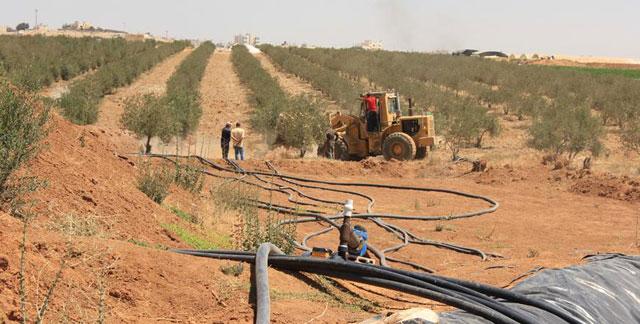You are here
‘Jerash, Ajloun to receive higher water supply’
By Hana Namrouqa - Apr 01,2018 - Last updated at Apr 01,2018
AMMAN — Water supply in the northern governorates of Jerash and Ajloun is expected to increase this summer, as the National Water Carrier project joins the country’s water resources network, a government official said on Saturday.
Construction on the project has been completed last year, an official at the Ministry of Water and Irrigation said, indicating that the ministry is now pressure-cleaning the carrier on multiple phases in preparation for providing water to the north via the carrier this summer.
The national carrier consists of water systems in the south and centre of the country. It connects water projects in the south of the Kingdom to projects in the central and northern regions, in order to better supply water-distressed areas, especially in the north, via an expansive network of 600 kilometres of pipelines, according to the ministry.
“The ministry started last week pressure cleaning the part of the carrier that extends on 70 kilometres from Abu Alanda reservoir in east Amman, passing through Khaw pumping station in Zarqa and Zaatari pumping station in Mafraq to Jerash and Ajloun,” the official source told The Jordan Times.
He underlined that the carrier is designed to supply Ajloun and Jerash with 10 million cubic metres of water annually.
“The carrier will join the national water network of resources once the need during summer arises,” the official said.
The national carrier is one of the ten projects listed under the ministry’s water supply strategy for the northern governorates, launched in December 2015.
The strategy entails implementing projects worth $308 million to provide Irbid, Jerash, Ajloun and Mafraq governorates with freshwater, in addition to renovating water networks in Irbid, Jerash and Ajloun.
“The carrier will ease part of the water problem in the north, as water share per capita dropped drastically with the start of the Syrian crisis, as the north host the majority of Syrian refugees in Jordan,” the official noted.
The northern governorates suffer from an acute water shortage caused by limited resources, violations against main water lines and deteriorating networks, while the water situation has worsened due to the arrival of Syrian refugees, according to ministry officials.
As the conflict in Syria enters its eighth year, Jordan continues to host 1.4 million Syrians. Water demand in the northern region, which hosts the majority of the refugee population, rose by 40 per cent, while per capita share of water dropped drastically, according to the ministry.
Official figures indicate that up to 90 per cent of Syrian refugees in Jordan live among host communities, while the rest is accommodated in refugee camps.
Related Articles
AMMAN — Implementation of the Wadi Al Arab Water Conveyance Project has commenced, with the goal of supplying the northern region with 45 mi
AMMAN — The northern governorates, where water demand increased by 40 per cent over the past seven years, are set to receive additional wate
Water subscribers in the northern governorates increased by 15 per cent in 2014 due to the fact that the region hosts the majority of Syrian refugees residing in the Kingdom, government officials said on Saturday.


















